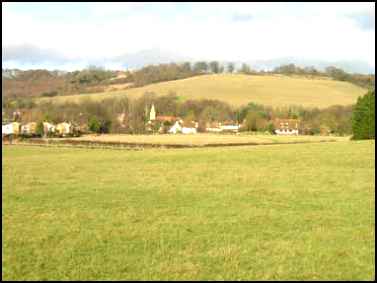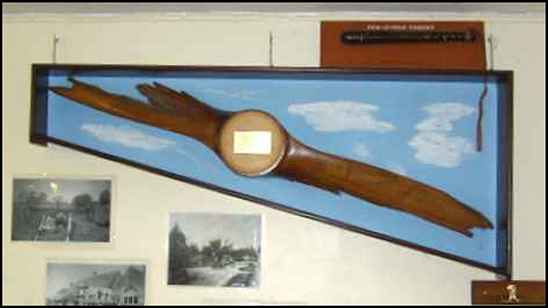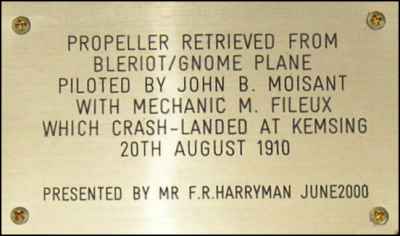
|
Registered Charity No.1099289 Tel.01732761772 |
 |
|
Photo from Kemsing Heritage Centre. Courtesy of Janet Eaton, 8-22-05 |
 |
 |
|
|
|
18 August, 1910 Via email from Janet Eaton, Kemsing, Kent Trustee of Kemsing Heritage Centre, 8-11-05 While the repairs were being carried out, the plane became the object of much local interest and crowds came to look at it, and a local girl, Matilda Burr, was given the task of looking after Moisant's mascot, a small kitten. Moisant himself was injured in the crash and spent time recovering with Sir Mark E. Collet at St. Clere, the local 'big' house in Heaverham. The repairs to the plane were carried out by Sir Mark's chauffeur and Mr Chandler of Noahs Ark (a local hamlet) under a cover erected by Mr James Reeves of Heaverham, the local blacksmith, who charged twopence for anyone to come and have a look! On his first attempt at taking off, he flew round St. Clere at the request of Sir Mark's wife, Dame Nina, who, being housebound, had never seen a plane. In doing this however, he fouled an oak tree and delayed the take-off again until 6th September. After another forced landing, he eventually reached the Crystal Palace in South London where the plane was put on view to the public. The propellor from Moisant's crashed plane was left at St. Clere, and now hangs on the wall of the Kemsing Heritage Centre,(see our website). The Collet family originally came from the Isle of Man, and Sir Mark returned there to live in the late 1930's hence the connection with that place. Presumably this old lady was a servant at St. Clere who went to the island to live with them on Sir Mark's retirement. I would be very keen to get in touch with Dawn Taylor from the Isle of Man who contacted you, to see whether we could re-unite the propellor and the letter opener after almost one hundred years. If you could either send her a copy of this e.mail, or give me her e.mail adress I would be pleased to hear from her. Best wishes, Janet Eaton |
| Editor's Note: I heartily recommend that you visit the website of the Kemsing Heritage Centre. You will find some very interesting facts about the area, nicely illustrated with beautiful photographs. You can access it by clicking on the link above. |
 |
 |
|
My name is Dawn Taylor, I live in the Isle of Man. Six years ago I had the job of clearing out a cottage belonging to an old lady, who had decided to move to a retirement home. She died last November aged 100 years. Amongst the bags of rubbish which I was supposed to take to the tip, I found a small letter opener. The blade is made of silver, the other end looks as if it could hold a pen nib, in the middle is a piece of turned wood. Inscribed on the blade are these words, "Wood Of Moisants Propeller, Smashed At Kemsing, 28 August 1910." When I first became intrigued by this letter opener I did use the internet, but didn't have any success and I felt sure it had nothing to do with aeroplanes. In my mind, I imagined the British Army quelling an uprising among the natives, in some far flung outpost of the British Empire and that the propeller mentioned was from a small boat. Also I couldn't find the name Kemsing in any of my books or atlas, and it does sound as if it could be in India or China. I had tried without success to make sense of these words until I wrote to the Imperial War Museum, who kindly sent me a photocopy of a passage taken from this book. written by DAVID WRAGG. The old lady who had this item in her possession worked as a parlour maid to Sir Mark and Lady Collett, who I believe had both died by the 1960s and the Collett family estate wasn't very far from where Moisants plane crashed. When I first became intrigued by this letter opener, I did use the internet, but didn't have any success, and I felt sure it was nothing to do with aeroplanes, in my mind. I imagined the British Army quelling an uprising among the natives, in some far flung outpost of the British Empire and that the propeller mentioned was from a small boat, also I couldn't find the name Kemsing in any of my books or atlas, and it does sound as if it could be in India or China. I hope you don't mind me writing to you, perhaps you could find out more than I have been able to. I am just so pleased to have saved this little piece of history from destruction and when I hold the wood between my fingers I try to imagine that courageous young pioneer John B Moisant. I will arrange to have some decent photos taken, the letter opener is only small and my skills at photography and computing are very basic. Kind Regards, Dawn Taylor |
|
via email from Dawn Taylor, 4-28-05 Moisant was attempting to fly from Paris to London at the time that he crashed in 1910, he was flying to Wratham to refuel but he failed to clear the Otford Hills and finally crash-landed at Kemsing near Sevenoaks Kent. Yours Sincerely Dawn Taylor |
|
via email from Jane and Marc, 4-26-05 Do you know any more about the actual crash site? We would be interested to learn how close it was to our home! Many Thanks, Jane and Marc Editor's Note: Our thanks to Jane and Marc for helping to clear up the mystery as to the location. I don't have any information about the actual crash site, so if you can help us, please contact me and I will forward your message to them. |


|